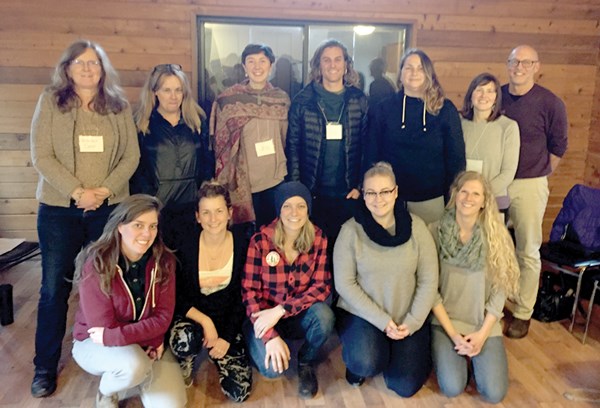Four teachers and seven community members who work with youth and youth-violence issues recently received training to help teens challenge sexism and inappropriate sexual and relationship behaviour.
Sunshine Coast Community Services Society’s (SCCSS) one-day Mentors in Violence Prevention (MVP) training was held at Mission Point House on International Women’s Day, March 8. Participants learned the damaging impact of gender stereotyping and demeaning language, which can lead to bullying, violence and many other forms of abuse.
Guest facilitator Wayne Spychka, SCCSS’s former Police-Based Victim Services coordinator, and co-facilitator Heather Conn, coordinator of the MVP program, helped attendees present and discuss hypothetical scenarios involving unwanted conduct, from sexual harassment to abusive texting. They discussed safe, empowering ways to confront, interrupt, and prevent gender violence such as challenging a would-be perpetrator or reporting an incident.
“The MVP program helps us broaden our view of relationship violence to include sexist language or controlling behaviour and to really examine our attitudes about what gender violence truly means,” says Conn.
Sunshine Coast Services’ MVP program promotes the “bystander approach” in handling gender violence. Spychka explains: “Rather than focus on young men and women as potential perpetrators or victims, we want them to see themselves as empowered bystanders who can confront peers who are acting abusively and support the young women subjected to these actions.”
Event attendees included two RCMP employees, two community school teachers, two elementary school teachers and five SCCSS employees. As new adult MVP mentors, they will facilitate discussions on gender violence scenarios and gender stereotyping with selected youth who, in turn, will serve as mentors to younger youth.
To date, SCCSS’s MVP program has focused solely on local high schools, training youth MVP mentors in grades 11 and 12 to serve as mentors for students in Grade 8 (and in a few cases, Grade 7). So far, 45 adult mentors and about 80 youth mentors have received MVP training in five main school programs throughout the Lower Sunshine Coast. Additionally, Chatelech Secondary School has mentored about 90 Grade 8 students with MVP content since last fall.
The goal is to make the MVP model an ongoing, sustainable part of regular curriculum, incorporating all grades from 8 to 12. SCCSS is hoping that where appropriate, trained adult mentors can now also present MVP-related content in local elementary and community schools. Ultimately, SCCSS would like to expand its MVP model into workplaces and sports teams.
The MVP project on the Sunshine Coast, part of SCCSS’s Together Against Violence programs, is the first of its kind in Canada. It began in 2015 as a collaboration between SCCSS and School District No. 46. Training materials are provided by MVP Strategies, a program developed in the early 1990s in Boston, Mass., based on a peer leadership model using trained student leaders.
For those seeking more information or wishing to further support this work through donating, please contact [email protected] or [email protected].



